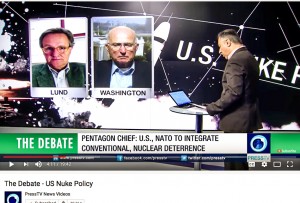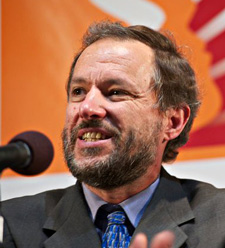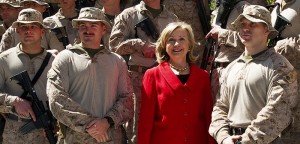Archive for the ‘Terrorism’ Category
U.S. nuclear weapons – two very different world views
By Jan Oberg
Last night I had the opportunity to discuss nuclear weapons with an experienced, high-ranking security analyst who has been both a military, a scholar, an assistant secretary of defence, presidential adviser, a corporate man and now a think tank member, Lawrence J. Korb.
We were discussing the issues touched upon in this and this article.
I would assume that the debate – facilitated by Iran’s PressTV in an excellent manner – is illustrative of the degree to which the world can be seen from different perspectives and how different we can perceive words such as law, legality, ethics, security, deterrence and peace.
I assume also that the debate illustrates the difference between a systems-embedded interpretation of the world and an independent or free perception, including what can and must be changed and what doesn’t have to change to make the world a better place.
Enjoy!
9/11 Anniversary: What could have been!
Fifteen years ago on 9/11, Al Qaeda terrorists changed the course of history, and the consequences of what happened on that day are still very much with us, and are arguably even growing more complex and more dangerous.
On 11 September 2001, 19 young Arab militants affiliated to Al Qaeda who had received rudimentary flying instruction in the United States hijacked and flew two passenger aircraft at the twin towers of the World Trade Center in New York, one at the Pentagon in Washington and another aircraft was allegedly also flying towards the White House or the Capitol but it was brought down before it reached its target.
Nearly 3,000 innocent people were killed as the result of those terrorist outrages. In response, America launched the “War on Terror” that has killed upward of a million people, destroyed many Middle Eastern countries, ruined the lives of tens of millions, killed nearly 7,000 US troops and injured another 50,000, and has cost the United States a staggering six trillion dollars.
This was the first time in US history that the American mainland had been attacked after the British troops had set fire to the White House in 1814 during the war between the United States and England. Even during the Second World War the continental United States did not receive any direct attacks, and the closest that the Japanese got was to attack the US naval base at Pearl Harbour in Hawaii, on December 7, 1941.
Of course, during the past few decades there have been numerous terrorist attacks on the US and other targets, the most notable being the attack carried out by Timothy McVeigh on the Alfred P. Murrah Federal Building in Oklahoma City, which claimed 168 lives and left over 800 people injured. McVeigh too had religious motivations for his attacks.
He was a religious fanatic and a follower of David Koresh, and he bombed the federal building on the anniversary of the destruction of the Branch Davidian camp in Waco by federal forces, as the result of which Koresh, 54 other adults and 21 children were burnt alive
One can think of the massacre of close to a million Tutsis and Hutus in Burundi and Rwanda. A Human Rights Watch analysis estimated that 77% of the Tutsi population of Rwanda was slaughtered in the Rwandan Genocide of 1994.
Apart from the initial slaughter of hundreds of Palestinians and the ethnic cleansing of nearly 70% of the Palestinian population in 1948, we had the slaughter of as many as 3,500 Palestinian refugees at the Sabra and Shatila Camps in Lebanon by the Christian Phalangists between the 15 and 16 September 1982, under the supervision of the invading Israeli forces led by Ariel Sharon.
However, the 9/11 attacks have assumed a significance far greater than all other terrorist acts in the world.
Most Americans believe Read the rest of this entry »
TFF PressInfo # 388: The War On Terror – A predictable fiasco
By Jan Oberg
This coming Sunday marks the 15th anniversary of what could be called the most counter-productive, if not stupid, war in modern history: The War On Terror. Today that war is much much more dangerous to the world’s future than the terrorists it is allegedly supposed to hunt down. And it has caused thousands of times more suffering, death and destruction – at least a million innocent people killed.
It’s not a war on terrorism but on terrorists and that is as smart as trying to fight all diseases by killing patients. It’s a war fought without any consideration of the one big question: Why did they do it and why do they do it? Media and politics only asking: Who did it? How was it done? Where? How to respond?
Without an intelligent, comprehensive diagnosis of 9/11 it could only go wrong. And it has.
The next problem was that ‘terrorism’ was suddenly defined by states as anything non-state that threatens society and states. Governments and the UN (which consists of them) conveniently omitted terrorism as a term for what states do and have done on a regular basis and on a much larger scale. Such as the nuclear balance of terror.
About 400 people were killed annually and worldwide before 9/11 according to US State Department statistics – reporting of that stopped in 2004 when figures soared after the War On Terror gained momentum. However, according to the 2015 Global Terror Index – the number is now 32,000 – and the far majority killed outside the West. So, the problem has increased exactly 80 times(!)
And the Western leaders who continue this war has no idea about how to stop it or do something more productive and intelligent to the world. Primitive tit-for-tat and disproportional responses has substituted what was once called statesmanship.
And it was predictable that it would be a fiasco!
Many both inside and outside the U.S. came up with Read the rest of this entry »
Vem kan tro på historien om Nine Eleven?
Av Ola Friholt
Det är nu 15 år sedan den ödesdigra dagen 11 september 2001. Sedan dess har kriget mot terrorismen utvecklats och krävt minst två miljoner liv och lika många psykiskt och fysiskt skadade, allt enligt en utredning från USAs läkarsällskap, ”Physicians for Social Responsibility” (med 50 000 medlemmar och medlem av Läkare mot kärnvapen).
Resultatet av kriget mot terrorismen är dessutom negativt även för väst. Idag har attentaten och offren i väst mångdubblats.
Lika anmärkningsvärt är att medborgarnas fri- och rättigheter i väst dramatiskt har urholkats. Kontrollen uppifrån är närmast total med avlyssning utan praktisk begränsning.
Hemliga fångläger med tortyr av godtyckligt fängslade har avslöjats i Polen, Tjeckien, Kosovo och Egypten, utöver de öppet erkända på Guantanamo, i Afghanistan och Pakistan. Ett sextiotal personer har suttit på Guantanamo i fjorton år utan rannsakan och dom från USA, som förr kallats ”Världens största demokrati”.
Den 11 september kan alltså kopplas till urholkning av demokratiska fri- och rättigheter, utomrättsligt dödande i stor skala, godtyckligt fängslande, officiellt påbjuden tortyr m m. Till detta kan läggas intensifierade rustningar och nya krig på bekostnad av fredlig dialog och konfliktlösning. Sveriges regeringar har följsamt godtagit både den officiella bilden av händelserna den 11 september 2001 och dess såväl militära som civila konsekvenser.
Det är ingen tillfällighet att avlyssningsstationerna på Lovön och Lerkil hör till världens största och att rymdforskningsstationen Esrange i Kiruna förmedlar satellitdata till USA/Nato för deras krigföring.
Och Sverige deltog i förmenta antiterrorkrig i Afghanistan och Libyen.
Det finns anledning att omvärdera hela utvecklingen under femton år och ifrågasätta själva den åberopade grunden för denna utveckling: raserandet av World Trade Centre.
Ifrågasättandet av den officiella beskrivningen av den händelsen började nästan omedelbart. Idag finns en hel litteratur som smular sönder den bild som är officiellt accepterad i väst. Vad var det som egentligen skedde, och vem låg bakom?
Betydande analyser gjordes av Andreas von Bülow, tidigare minister för teknologi och forskning i Helmut Schmidts regering i Tyskland, med boken ”CIA och 11 september” (2003) på Alhambra förlag. Professor David Ray Griffin har publicerat flera böcker, på svenska ”Motsägelser om 11 september”, Alhambra 2008, och ”WTC 7 och dess mystiska kollaps”, Alhambra 2010. Dessutom omfattande analyser på Internet, t ex Wood & Reynolds: ”The Star Wars Beam Weapons and Star Wars Directed Energy Weapons” (2006) och D A Khalezov: ”911thology: The Third Truth about 9-11” (2013), 1092 sidor.
För en sunt tänkande människa ter det sig orimligt att makthavare skulle kunna bedriva en politik som drabbar det egna folket. Ändå är detta vardagsmat sedan århundraden, med nittonhundratalet som eländets höjdpunkt. Då offrades långt över 100 miljoner liv även av ledare som kallade sig demokratiska. Det ansågs självklart att utkämpa världskrigen så som de utkämpades.
Likaså krigen för och emot kolonial befrielse och krigen för kontroll över råvarutillgångar och marknader. Och sedan årtionden dör cirka hundratusen människor varje dag i sviterna av världens orättvisor utan att särskilda insatser görs för att förhindra det.
De senaste åren har destabilisering och förstöring av stater stått på stormaktsprogrammet under uppenbart falska förevändningar men utan att väcka förvåning. Ansvariga är främst USA och England under medverkan av övriga Nato. Detta hindrar inte att majoriteten av Sveriges politiska partier och riksdagen liksom regeringen alltmer närmar sig Natomedlemskap, utan att gå in i den debatt som borde vara självklar i en demokrati.
Att ledare är beredda att offra tusentals av sitt eget och andra folk för tvivelaktiga mål är således väl belagt.
Det finns all anledning att tvivla på de förklaringar en stormakts ledare ger.
Den 11. 9. 2001 sägs alltså 19 muslimska flygkapare ha flugit in i World Trade Centres två högsta skyskrapor och därigenom fått dem att rasa till grunden. Read the rest of this entry »
The sky above Turkey has much blue in it
By Richard Falk
August 10, 2016
Prefatory Note
An earlier version was published by Middle East Eye on August 10, 2016. It seems so important at this time for the sake of the future of Turkey that the West look at the country and its political circumstances in a far more balanced way than how the situation has been portrayed since the coup. How to explain this imbalance is another matterthat should be explored at some point, but for now is largely put aside.
Much uncertainty remains in Turkey, but there is enough evidence of positive tendencies to raise a tentative banner of hope. Being a witness to the political atmosphere in Turkey that has emerged after the failed coup of July 15th puts me at odds with the secular consensus in the West, which looks up at the sky and sees only dark, ominous clouds of human rights abuse and autocratic leadership.
What I have experienced and observed so far is quite different, a sky with much blue in it.
There are two opposed, although overlapping, tendencies present that seemed to be responsive to the political priorities that top the post-coup government agenda: sustaining the anti-coup unity by shifting political gears within the AKP leadership circles in the direction of “inclusive democracy” and pragmatism, and with it, a retreat from the polarizing claims of “majoritarian democracy” that greatly intensified after the 2011 national elections and were particularly evident in the clumsy, unacceptable way the Turkish government handled the Gezi Park demonstrations two years later.
The most important concrete embodiment of this post-15 July move toward inclusiveness has been a series of initatives intended to create a common front between the three leading political parties in the country, including the CHP (secular mainstream) and MHP (nationalist rightest) opposition parties.
This has been reinforced by several other developments, Read the rest of this entry »
Over-hyping ISIS
By Jonathan Power
Politicians have it in their DNA to hype our supposed present dangers. So do journalists. So does the military-industrial complex. So do certain think tanks and university professors who depend on sounding the alarm about this and that to gain grants from foundations.
When Leon Panetta was defence secretary under President Barack Obama he was not atypical when he said that any defence cuts would undermine the military’s “ability to protect the nation” and reductions would “invite aggression”.
Yet today’s wars tend to be low-intensity conflicts that on average kill 90% fewer people than the wars of the 1950s. The first decade of this century had fewer war deaths than any decade of the last century.
As for terrorism nothing is more over-hyped.
Of the 13,186 people killed in terrorist attacks in 2010 only 15 were American citizens. Unless you live in Pakistan, Afghanistan, Iraq, Yemen, Somalia or Syria the chance of dying from a terrorist attack today has fallen to just above zero. Even the latest spate of bomb attacks in France and Belgium barely affect this world percentage.
The US is almost Islamic terrorist-free. What terrorism there is comes from right wing white men. Read the rest of this entry »
Hillary The Hawk
The most comprehensive documentation of Hillary Clinton’s systematic support for military action and of her deceptive talk, if not lies.
From The Cairo Review of Global Affairs







